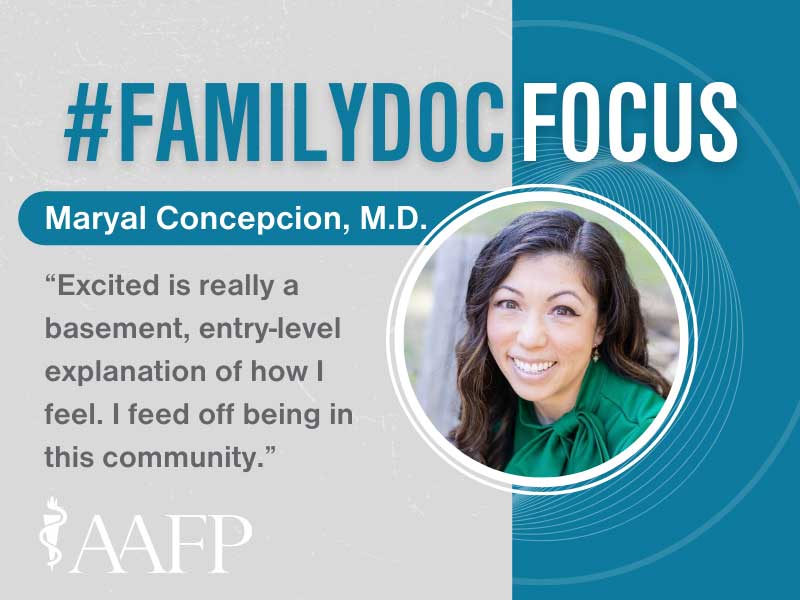Spreading the Word About Direct Primary Care
May 9, 2022, 3:59 p.m. David Mitchell — Two of the nation’s largest direct primary care conferences were held virtually in 2021 due to the pandemic. This summer, those events will be held in person in back-to-back months.

Maryal Concepcion, M.D., will play a role in both the Hint Summit, June 7-9 in Denver, and the DPC Summit, July 15-17 in Kansas City, Mo. The host of the My DPC Story podcast, Concepcion is, for lack of a better word, excited.
“Excited is really a basement, entry-level explanation of how I feel,” she said. “I feed off being in this community. I remember what it was like being at DPC conferences before the pandemic, and that was before I had even started my podcast and before I opened my DPC practice and started eating, living and breathing DPC.”
Concepcion started looking into direct primary care in 2019 during contract negotiations with her employer. During a California AFP meeting in Monterey, Jeannine Rodems, M.D., of Santa Cruz DPC spent 90 minutes answering Concepcion’s questions. One of Rodem’s most important pieces of advice was to attend the Hint Summit the following week in San Francisco.
“Dr. Rodems said, ‘I don’t care what you’re doing,’” Concepcion said. “‘You drop everything, and you get there.’ That was my first summit. Ever since then it’s been like, anything I can attend that involves DPC, I will be there.”
Concepcion was an employed, salaried family physician in Arnold, Calif., for six years. She and her husband, who live in the Stanislaus National Forest, were two of the few primary care physicians in the area. In September 2020, Concepcion received a letter from her employer that made up her mind about the future of her career. It said that if she did not sign a relative-value-unit-based contract, she would be terminated.
Concepcion was 28 weeks pregnant at that time.
“You know the saying, ‘You don’t piss off a pregnant woman?’” Concepcion said. “That’s what happened with me. I harnessed that energy and I said, ‘I can’t do anything but leave fee-for-service and use my passion to get the word out about direct primary care to everybody who will listen because this is absolutely ridiculous.’”
The pandemic shut down medical conferences, including DPC events, and Concepcion missed the connections she had been making in a world she wanted to be part of. So soon after that life-changing letter arrived, Concepcion started her DPC podcast in 2020 before she launched her new practice in 2021.
“As I progress in my journey, there’s different questions asked,” said Concepcion, who posts an in-depth interview with a different DPC doctor every Sunday. “The earlier podcasts cover basic things, and then as I understood more and learned more the questions definitely changed.”
Concepcion’s podcast ranked 144th in the Apple Podcasts’ U.S. medicine category in early May. She has more than 42,000 listens on that platform, which accounts for a little more than half her audience.
“There’s nothing out there like it in terms of a DPC podcast in active production,” she said, “so people are clamoring for information. Like, ‘Oh, my God. There’s another way to practice medicine? How do I do this?’ Employers and people who want to work with the DPC ecosystem — especially people who are in residency, medical school or wanting to leave fee-for-service — are the listeners based on the feedback I get from people.”
While she started building her DPC patient panel, Concepcion also filled a locum tenens position in pediatrics at a federally qualified health center. That job ended in early May, so Concepcion now plans to focus on building out her practice. She has been offering telehealth and home visits and plans to secure clinic space by the end of the year so that she can offer more procedures. She still plans to offer her patients telehealth and home visit options.
“I have a 90-year-old patient who is healthy but definitely concerned with COVID and doesn’t want to leave home,” she said. “I have people who are like, ‘This is great. I don’t have to wait in a waiting room ever again.’”
Concepcion said having the autonomy required to offer two-hour, in-home visits is one of the things she loves about direct primary care. She will be moderating a panel discussion about business models at the DPC Summit as well as a discussion about social media. Concepcion also will serve as co-emcee of the Hint Summit, which is sponsored by the maker of the membership management and billing software of the same name that is used by roughly 1,000 DPC clinics.
Concepcion said the conferences offer a spectrum of programming for physicians who are anywhere from beginning considering direct primary care to having already become seasoned veterans of the model. She hopes the newcomers find the events as helpful as she did.
“The attraction, especially for the new people, is to really understand what this movement is,” she said, “and that it’s possible for them to be a part of it and to feel empowered to go to the next step, learn the tools and to be able to network with people who are part of this community who will elevate them and help them move forward.”